Assessment 1: Interpersonal Skills for Professionals Report
VerifiedAdded on 2023/06/09
|7
|1193
|351
Report
AI Summary
This report is a self-assessment of interpersonal skills, focusing on the application of the Big Five personality traits in a professional context. The introduction highlights the importance of interpersonal skills in the workplace and introduces the use of the Big Five model. The strengths section analyzes the positive aspects of the student's personality traits, specifically agreeableness and openness to experience, and their correlation with effective communication and leadership. The weaknesses section identifies introversion (low extraversion) as a challenge, acknowledging its impact on communication and potential limitations in team interactions. The integrating results section summarizes the findings, emphasizing the balance between strengths and weaknesses and the importance of continuous development, especially in improving extraversion. The report includes references to support the analysis and an appendix with the personality test results. The overall goal of the report is to provide insights for the student's professional development, focusing on how to leverage strengths and address areas for improvement in interpersonal skills.
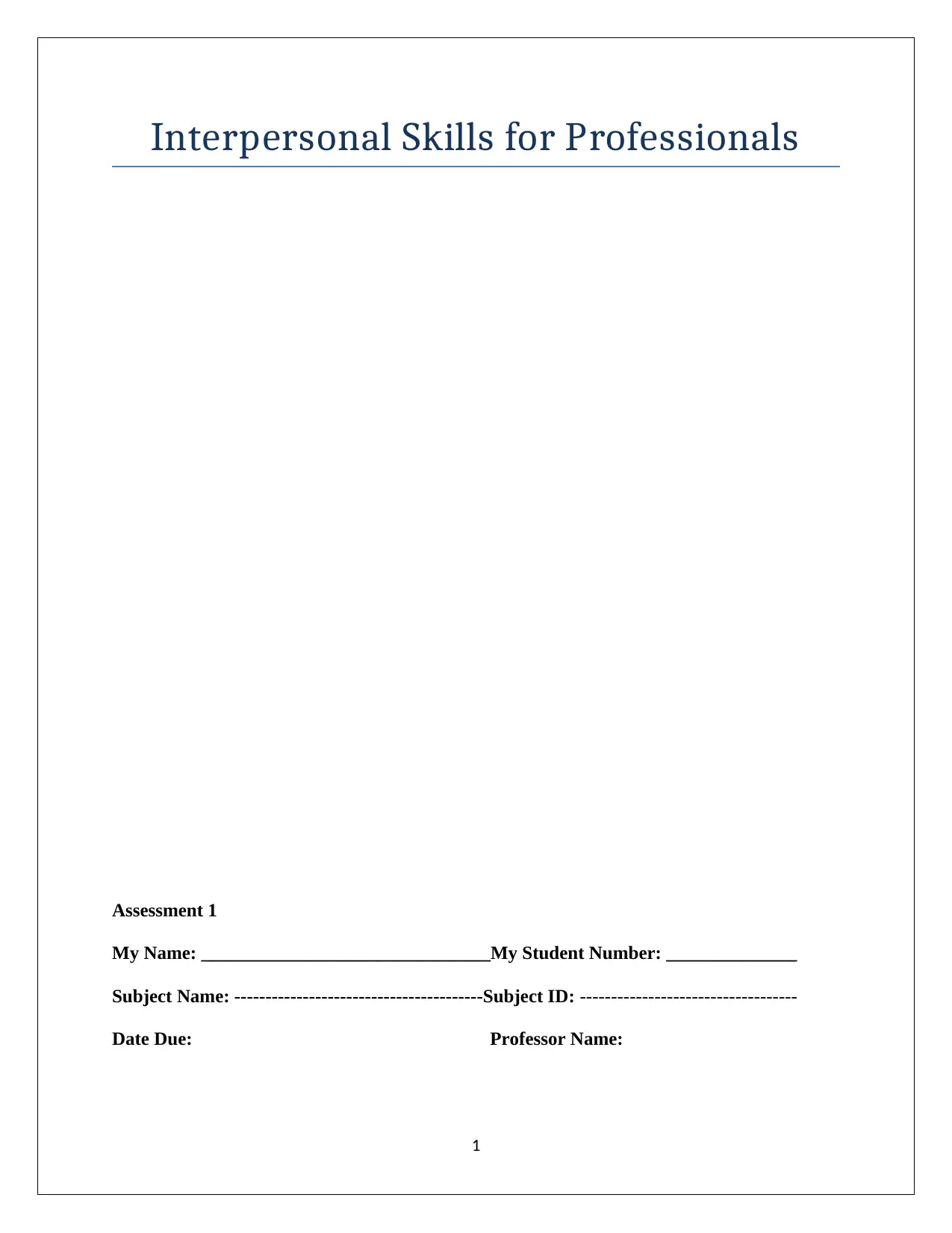
Interpersonal Skills for Professionals
Assessment 1
My Name: _______________________________My Student Number: ______________
Subject Name: ----------------------------------------Subject ID: -----------------------------------
Date Due: Professor Name:
1
Assessment 1
My Name: _______________________________My Student Number: ______________
Subject Name: ----------------------------------------Subject ID: -----------------------------------
Date Due: Professor Name:
1
Paraphrase This Document
Need a fresh take? Get an instant paraphrase of this document with our AI Paraphraser
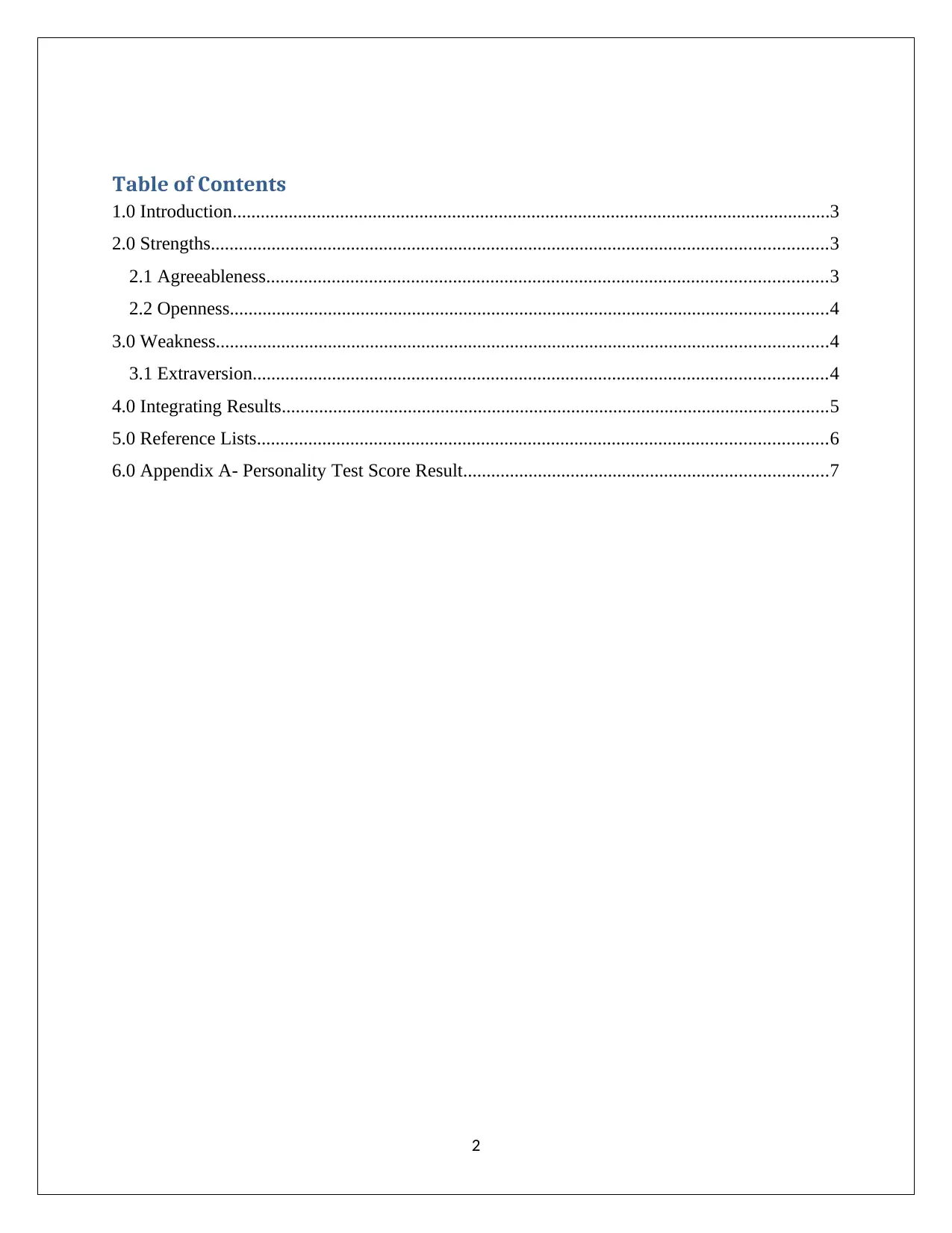
Table of Contents
1.0 Introduction................................................................................................................................3
2.0 Strengths....................................................................................................................................3
2.1 Agreeableness........................................................................................................................3
2.2 Openness................................................................................................................................4
3.0 Weakness...................................................................................................................................4
3.1 Extraversion...........................................................................................................................4
4.0 Integrating Results.....................................................................................................................5
5.0 Reference Lists..........................................................................................................................6
6.0 Appendix A- Personality Test Score Result..............................................................................7
2
1.0 Introduction................................................................................................................................3
2.0 Strengths....................................................................................................................................3
2.1 Agreeableness........................................................................................................................3
2.2 Openness................................................................................................................................4
3.0 Weakness...................................................................................................................................4
3.1 Extraversion...........................................................................................................................4
4.0 Integrating Results.....................................................................................................................5
5.0 Reference Lists..........................................................................................................................6
6.0 Appendix A- Personality Test Score Result..............................................................................7
2
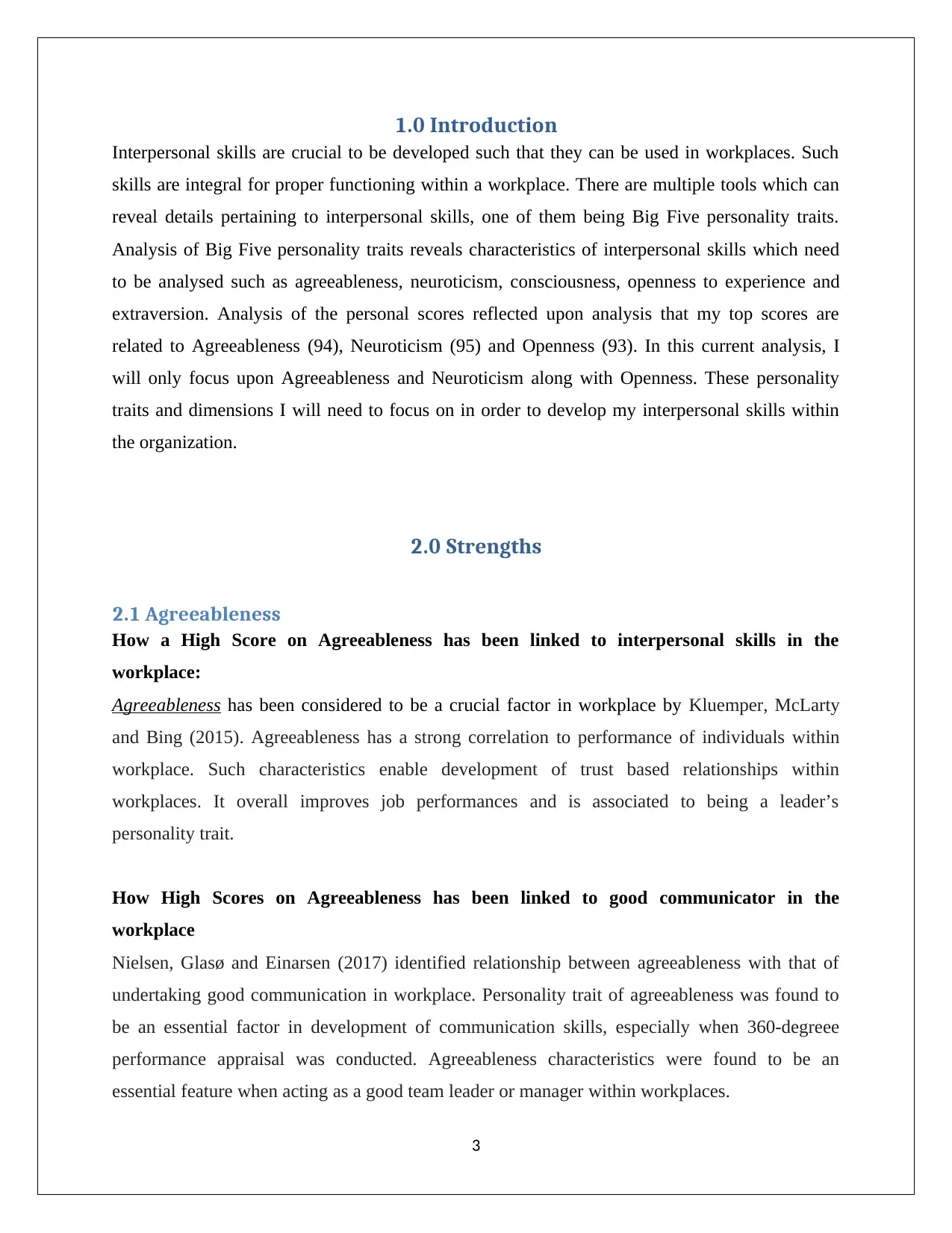
1.0 Introduction
Interpersonal skills are crucial to be developed such that they can be used in workplaces. Such
skills are integral for proper functioning within a workplace. There are multiple tools which can
reveal details pertaining to interpersonal skills, one of them being Big Five personality traits.
Analysis of Big Five personality traits reveals characteristics of interpersonal skills which need
to be analysed such as agreeableness, neuroticism, consciousness, openness to experience and
extraversion. Analysis of the personal scores reflected upon analysis that my top scores are
related to Agreeableness (94), Neuroticism (95) and Openness (93). In this current analysis, I
will only focus upon Agreeableness and Neuroticism along with Openness. These personality
traits and dimensions I will need to focus on in order to develop my interpersonal skills within
the organization.
2.0 Strengths
2.1 Agreeableness
How a High Score on Agreeableness has been linked to interpersonal skills in the
workplace:
Agreeableness has been considered to be a crucial factor in workplace by Kluemper, McLarty
and Bing (2015). Agreeableness has a strong correlation to performance of individuals within
workplace. Such characteristics enable development of trust based relationships within
workplaces. It overall improves job performances and is associated to being a leader’s
personality trait.
How High Scores on Agreeableness has been linked to good communicator in the
workplace
Nielsen, Glasø and Einarsen (2017) identified relationship between agreeableness with that of
undertaking good communication in workplace. Personality trait of agreeableness was found to
be an essential factor in development of communication skills, especially when 360-degreee
performance appraisal was conducted. Agreeableness characteristics were found to be an
essential feature when acting as a good team leader or manager within workplaces.
3
Interpersonal skills are crucial to be developed such that they can be used in workplaces. Such
skills are integral for proper functioning within a workplace. There are multiple tools which can
reveal details pertaining to interpersonal skills, one of them being Big Five personality traits.
Analysis of Big Five personality traits reveals characteristics of interpersonal skills which need
to be analysed such as agreeableness, neuroticism, consciousness, openness to experience and
extraversion. Analysis of the personal scores reflected upon analysis that my top scores are
related to Agreeableness (94), Neuroticism (95) and Openness (93). In this current analysis, I
will only focus upon Agreeableness and Neuroticism along with Openness. These personality
traits and dimensions I will need to focus on in order to develop my interpersonal skills within
the organization.
2.0 Strengths
2.1 Agreeableness
How a High Score on Agreeableness has been linked to interpersonal skills in the
workplace:
Agreeableness has been considered to be a crucial factor in workplace by Kluemper, McLarty
and Bing (2015). Agreeableness has a strong correlation to performance of individuals within
workplace. Such characteristics enable development of trust based relationships within
workplaces. It overall improves job performances and is associated to being a leader’s
personality trait.
How High Scores on Agreeableness has been linked to good communicator in the
workplace
Nielsen, Glasø and Einarsen (2017) identified relationship between agreeableness with that of
undertaking good communication in workplace. Personality trait of agreeableness was found to
be an essential factor in development of communication skills, especially when 360-degreee
performance appraisal was conducted. Agreeableness characteristics were found to be an
essential feature when acting as a good team leader or manager within workplaces.
3
⊘ This is a preview!⊘
Do you want full access?
Subscribe today to unlock all pages.

Trusted by 1+ million students worldwide
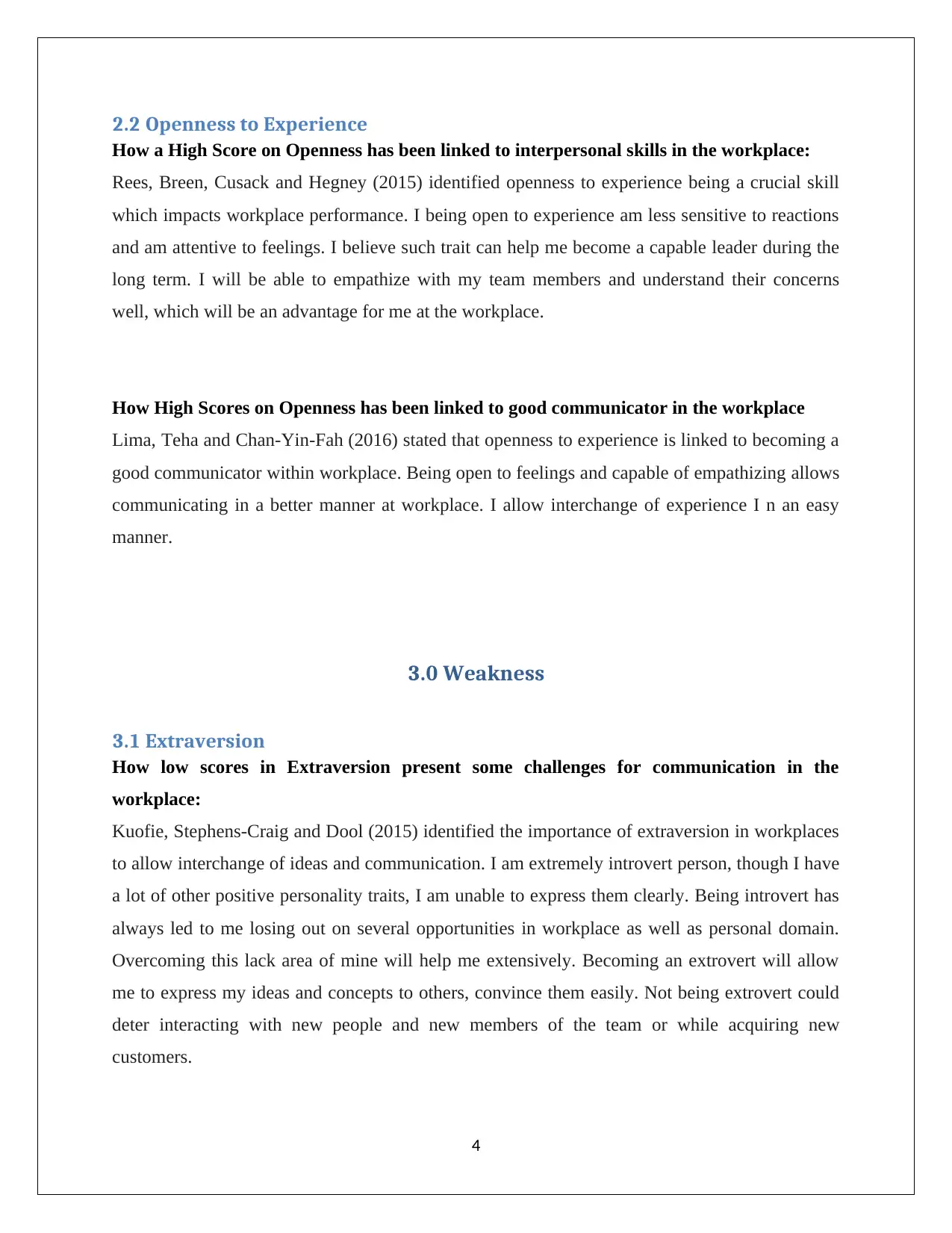
2.2 Openness to Experience
How a High Score on Openness has been linked to interpersonal skills in the workplace:
Rees, Breen, Cusack and Hegney (2015) identified openness to experience being a crucial skill
which impacts workplace performance. I being open to experience am less sensitive to reactions
and am attentive to feelings. I believe such trait can help me become a capable leader during the
long term. I will be able to empathize with my team members and understand their concerns
well, which will be an advantage for me at the workplace.
How High Scores on Openness has been linked to good communicator in the workplace
Lima, Teha and Chan-Yin-Fah (2016) stated that openness to experience is linked to becoming a
good communicator within workplace. Being open to feelings and capable of empathizing allows
communicating in a better manner at workplace. I allow interchange of experience I n an easy
manner.
3.0 Weakness
3.1 Extraversion
How low scores in Extraversion present some challenges for communication in the
workplace:
Kuofie, Stephens-Craig and Dool (2015) identified the importance of extraversion in workplaces
to allow interchange of ideas and communication. I am extremely introvert person, though I have
a lot of other positive personality traits, I am unable to express them clearly. Being introvert has
always led to me losing out on several opportunities in workplace as well as personal domain.
Overcoming this lack area of mine will help me extensively. Becoming an extrovert will allow
me to express my ideas and concepts to others, convince them easily. Not being extrovert could
deter interacting with new people and new members of the team or while acquiring new
customers.
4
How a High Score on Openness has been linked to interpersonal skills in the workplace:
Rees, Breen, Cusack and Hegney (2015) identified openness to experience being a crucial skill
which impacts workplace performance. I being open to experience am less sensitive to reactions
and am attentive to feelings. I believe such trait can help me become a capable leader during the
long term. I will be able to empathize with my team members and understand their concerns
well, which will be an advantage for me at the workplace.
How High Scores on Openness has been linked to good communicator in the workplace
Lima, Teha and Chan-Yin-Fah (2016) stated that openness to experience is linked to becoming a
good communicator within workplace. Being open to feelings and capable of empathizing allows
communicating in a better manner at workplace. I allow interchange of experience I n an easy
manner.
3.0 Weakness
3.1 Extraversion
How low scores in Extraversion present some challenges for communication in the
workplace:
Kuofie, Stephens-Craig and Dool (2015) identified the importance of extraversion in workplaces
to allow interchange of ideas and communication. I am extremely introvert person, though I have
a lot of other positive personality traits, I am unable to express them clearly. Being introvert has
always led to me losing out on several opportunities in workplace as well as personal domain.
Overcoming this lack area of mine will help me extensively. Becoming an extrovert will allow
me to express my ideas and concepts to others, convince them easily. Not being extrovert could
deter interacting with new people and new members of the team or while acquiring new
customers.
4
Paraphrase This Document
Need a fresh take? Get an instant paraphrase of this document with our AI Paraphraser
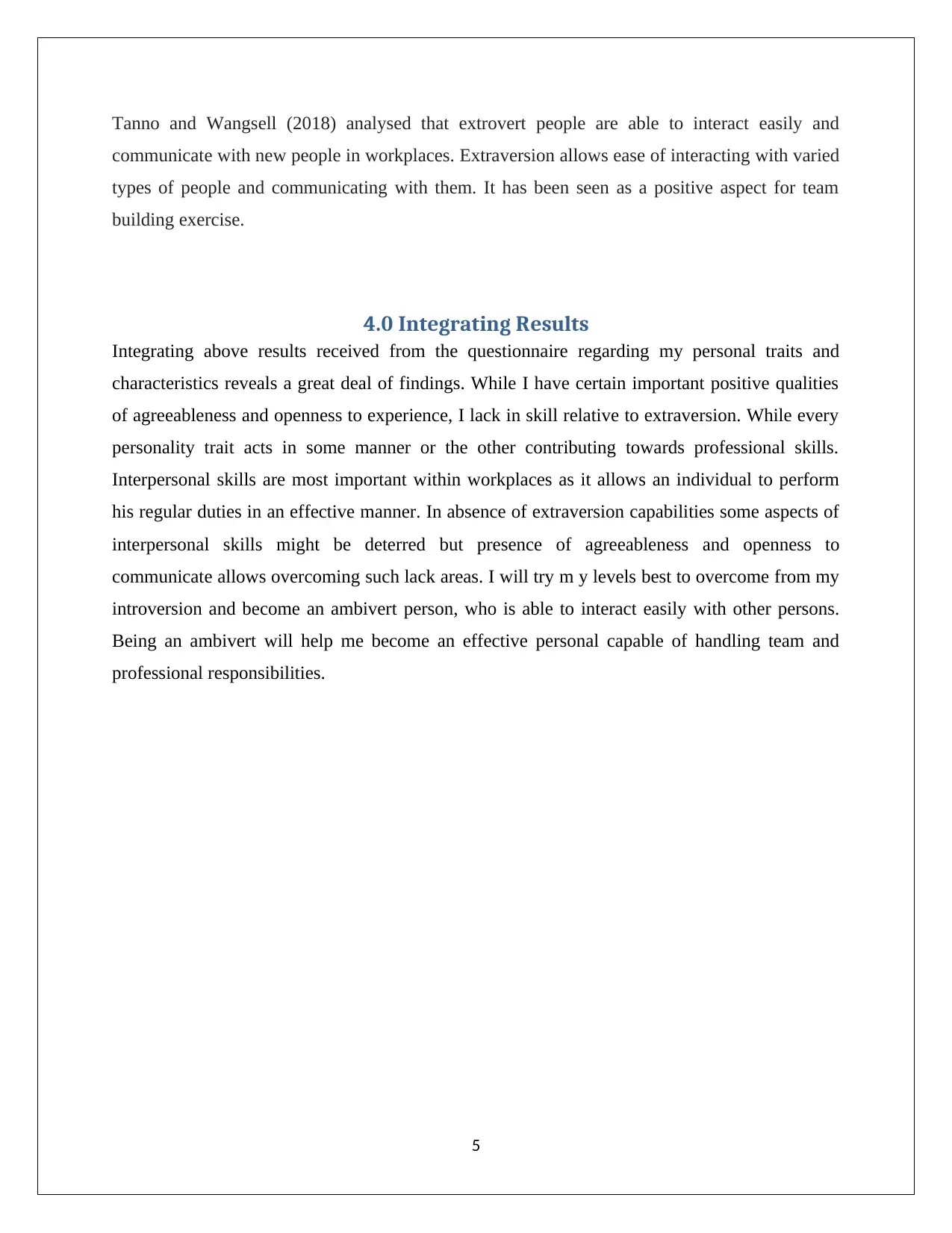
Tanno and Wangsell (2018) analysed that extrovert people are able to interact easily and
communicate with new people in workplaces. Extraversion allows ease of interacting with varied
types of people and communicating with them. It has been seen as a positive aspect for team
building exercise.
4.0 Integrating Results
Integrating above results received from the questionnaire regarding my personal traits and
characteristics reveals a great deal of findings. While I have certain important positive qualities
of agreeableness and openness to experience, I lack in skill relative to extraversion. While every
personality trait acts in some manner or the other contributing towards professional skills.
Interpersonal skills are most important within workplaces as it allows an individual to perform
his regular duties in an effective manner. In absence of extraversion capabilities some aspects of
interpersonal skills might be deterred but presence of agreeableness and openness to
communicate allows overcoming such lack areas. I will try m y levels best to overcome from my
introversion and become an ambivert person, who is able to interact easily with other persons.
Being an ambivert will help me become an effective personal capable of handling team and
professional responsibilities.
5
communicate with new people in workplaces. Extraversion allows ease of interacting with varied
types of people and communicating with them. It has been seen as a positive aspect for team
building exercise.
4.0 Integrating Results
Integrating above results received from the questionnaire regarding my personal traits and
characteristics reveals a great deal of findings. While I have certain important positive qualities
of agreeableness and openness to experience, I lack in skill relative to extraversion. While every
personality trait acts in some manner or the other contributing towards professional skills.
Interpersonal skills are most important within workplaces as it allows an individual to perform
his regular duties in an effective manner. In absence of extraversion capabilities some aspects of
interpersonal skills might be deterred but presence of agreeableness and openness to
communicate allows overcoming such lack areas. I will try m y levels best to overcome from my
introversion and become an ambivert person, who is able to interact easily with other persons.
Being an ambivert will help me become an effective personal capable of handling team and
professional responsibilities.
5

5.0 Reference Lists
Kluemper, D.H., McLarty, B.D. and Bing, M.N., 2015. Acquaintance ratings of the Big Five
personality traits: Incremental validity beyond and interactive effects with self-reports in the
prediction of workplace deviance. Journal of Applied Psychology, 100(1), p.237.
Kuofie, M., Stephens-Craig, D. and Dool, R., 2015. An overview perception of introverted
leaders. International Journal of Global Business, 8(1), p.93.
Lima, L.C., Teha, C.J. and Chan-Yin-Fah, B., 2016. A preliminary study of the effects of
personality traits on workplace deviance in the voluntary sector. International Review of
Management and Marketing, 6(7S), pp.6-10.
Nielsen, M.B., Glasø, L. and Einarsen, S., 2017. Exposure to workplace harassment and the Five
Factor Model of personality: A meta-analysis. Personality and individual differences, 104,
pp.195-206.
Rees, C.S., Breen, L.J., Cusack, L. and Hegney, D., 2015. Understanding individual resilience in
the workplace: the international collaboration of workforce resilience model. Frontiers in
psychology, 6, p.73.
Tanno, L. and Wangsell, E., 2018. My preferable workplace-A quantitative study about what
HR-students find attractive in a coming employer and possible difference between gender and
level of extroversion.
6
Kluemper, D.H., McLarty, B.D. and Bing, M.N., 2015. Acquaintance ratings of the Big Five
personality traits: Incremental validity beyond and interactive effects with self-reports in the
prediction of workplace deviance. Journal of Applied Psychology, 100(1), p.237.
Kuofie, M., Stephens-Craig, D. and Dool, R., 2015. An overview perception of introverted
leaders. International Journal of Global Business, 8(1), p.93.
Lima, L.C., Teha, C.J. and Chan-Yin-Fah, B., 2016. A preliminary study of the effects of
personality traits on workplace deviance in the voluntary sector. International Review of
Management and Marketing, 6(7S), pp.6-10.
Nielsen, M.B., Glasø, L. and Einarsen, S., 2017. Exposure to workplace harassment and the Five
Factor Model of personality: A meta-analysis. Personality and individual differences, 104,
pp.195-206.
Rees, C.S., Breen, L.J., Cusack, L. and Hegney, D., 2015. Understanding individual resilience in
the workplace: the international collaboration of workforce resilience model. Frontiers in
psychology, 6, p.73.
Tanno, L. and Wangsell, E., 2018. My preferable workplace-A quantitative study about what
HR-students find attractive in a coming employer and possible difference between gender and
level of extroversion.
6
⊘ This is a preview!⊘
Do you want full access?
Subscribe today to unlock all pages.

Trusted by 1+ million students worldwide

6.0 Appendix A- Personality Test Score Result
7
7
1 out of 7
Related Documents
Your All-in-One AI-Powered Toolkit for Academic Success.
+13062052269
info@desklib.com
Available 24*7 on WhatsApp / Email
![[object Object]](/_next/static/media/star-bottom.7253800d.svg)
Unlock your academic potential
Copyright © 2020–2025 A2Z Services. All Rights Reserved. Developed and managed by ZUCOL.





